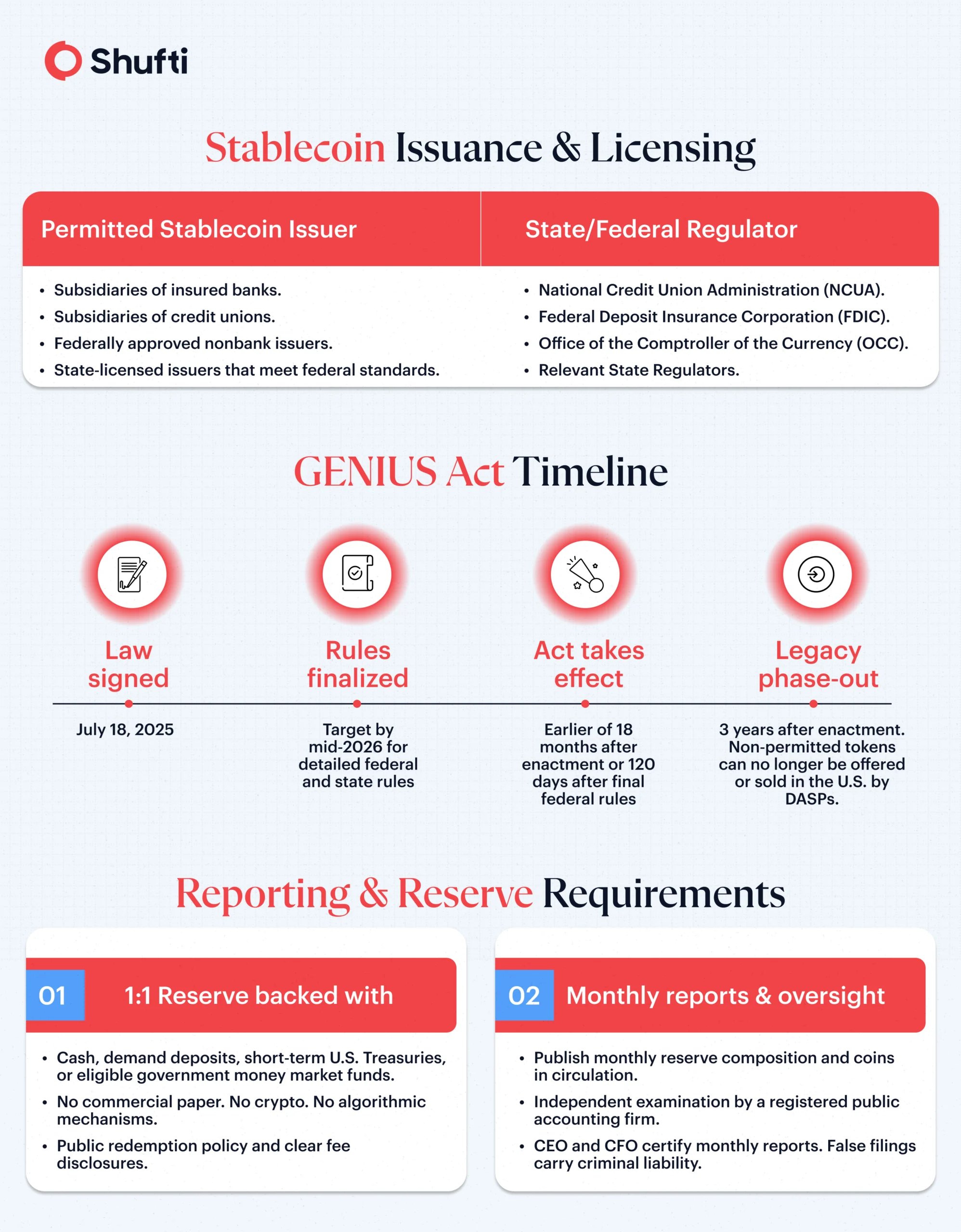Is the GENIUS Act the Start of a New Regulatory Era for Digital Assets

- 01 What is the GENIUS Act in the crypto industry?
- 02 Who can issue stablecoins in the US?
- 03 Key GENIUS Act rules and regulations
- 04 Why does the crypto industry now require a higher level of assurance in authentication?
- 05 When do GENIUS Act requirements take effect?
- 06 Key impacts on digital assets and the U.S. market
- 07 How Shufti helps crypto platforms in complying with the GENIUS Act
Guiding and Establishing National Innovation for U.S. Stablecoins Act, or GENIUS Act, is the first of its kind crypto-related US legislation. The Act puts an end to a long-standing debate over whether stablecoins should be treated as a security or a commodity.
The U.S. digital asset landscape entered a new era of regulatory certainty with the signing of the GENIUS Act into law on July 18, 2025, and announced America’s first federal framework for payment stablecoins.
For anyone involved in identity verification, compliance management, or broader fintech compliance, understanding these changes is now critical not just for legal survival, but to find new opportunities in digital finance.
What is the GENIUS Act in the crypto industry?
Stablecoins are less volatile digital tokens, pegged to a currency or commodity to stabilize their value. These digital assets aim to combine the stability of traditional money with the innovation offered by blockchain technology to enable more secure, cost-effective, and faster cross-border payments. This is where the need for a transparent and consumer-centric regulatory regime comes in to ensure stablecoins deliver their promise of stability, security, and efficiency.
Regulatory uncertainty has long been a roadblock for stablecoins in the U.S., with a confusing mix of state-level rules and little federal oversight. The GENIUS Act finally brings order by establishing a standardized federal regime focused on consumer safety and market stability.
In 2022, Terra, an algorithmic stablecoin pegged to USD and backed by its sister coin LUNA, wiped out almost half a trillion USD from the crypto market as a result of a stablecoin run and depegging. This law does more than organize the market by directly addressing these real risks, such as previous stablecoin runs, depegging, opaque reserves, and even fraud.
The GENIUS Act imposes clear lines of state and federal oversight on all issuers, requires them to publish monthly reports, undergo independent audits, and enforce strict reserve requirements, bringing stablecoins into nearly the same regulatory league as major banks.
For instance, before the Act, a stablecoin issuer could hold a mix of risky assets like cryptocurrency and call it backed-by-reserve. Now, only highly liquid, low-risk assets are allowed with defined oversight from the regulatory bodies.
Who can issue stablecoins in the US?
Now, not just anyone can launch a dollar-backed stablecoin. Here are some of the financial institutions that can issue stablecoins across the United States:

- Subsidiaries of federally insured banks or credit unions are subject to supervision of their primary federal regulators.
- Federally approved nonbanks — after a rigorous new application process subject to direct regulation by the Office of the Comptroller of the Currency (OCC).
- State-licensed issuers are permitted as long as their regimes match federal standards, but must shift to federal oversight if their coins in circulation exceed $10 billion.
Permitted issuers must comply with rigorous requirements, facing penalties of up to $100,000 per day for violations, plus the risk of license revocation and potential criminal charges for serious misconduct.
Key GENIUS Act rules and regulations
With the introduction of the new regulations and reforms for digital assets, stablecoins in the US market will be one of the best-protected digital assets with a clear regulatory roadmap.
Reserve requirements and reporting
All payment stablecoins must be fully backed, at all times, by high-quality liquid assets such as U.S. dollars, demand deposits, short-term Treasury bills, and shares in registered government money market funds. Assets such as commercial paper, cryptocurrency, or algorithmic mechanisms are not allowed as stablecoin reserves.
The GENIUS Act requires mandatory monthly reports on the number and composition of these reserves, examined by third-party auditors, and certified by the CEO and CFO of the stablecoin issuer for accuracy. For state-regulated issuers, if outstanding issuance reaches $10B, enhanced federal oversight applies and transitions are triggered under the Act. Stablecoin issuers whose outstanding coins exceed $50B must publish audited annual financial statements.
Bankruptcy priority and consumer rights
The GENIUS Act demands that, in the event of bankruptcy of the stablecoin issuer, the stablecoin holders will be prioritized over all other creditors. Coin holders must be able to redeem these coins at face value whenever they demand. At the same time, it prohibits issuers from falsely advertising that stablecoins have the status of a legal tender, or are backed by the government, or that coins are fully insured.
The new law prohibits stablecoin issuers from yielding or paying interest (in cash, tokens, or any form) to their customers solely for using, holding, or retaining such payment stablecoins.
The Act requires the adoption of similar standards at the federal and state levels, ensuring fair competition and a level playing field throughout the country. A fully-backed digital asset will establish consumer trust in the stablecoins, which will expand its adoption, increasing its demand and creating more business opportunities.
AML compliance and identity verification
One of the significant, perhaps the biggest, shifts introduced by the GENIUS Act is classifying stablecoin issuers as financial institutions and subjecting them to full-scale Bank Secrecy Act regulations. In order to fight risks of financial crimes and sanctions evasions, stablecoins will be obliged to implement customer due diligence, customer identification, and sanctions compliance programs. This necessitates advanced identity verification, AML screening, and know-your-customer (KYC) protocols, including:
- Customer identification and verification using government IDs, biometrics, or liveness checks.
- Ongoing due diligence, continuous transaction monitoring, and suspicious activity reporting.
- Real-time compliance capabilities, like the ability to freeze or block suspicious accounts on lawful order.
These obligations demand deploying technological capabilities to ensure a high level of assurance in identity verification and to seize, stop, or burn digital assets where required by law.
The GENIUS Act further requires that all permitted stablecoin issuers submit a certification that it has implemented AML and economic sanctions compliance programs in accordance with the requirements. This certification will be submitted within 180 days after receiving approval of the application and annually after that.
Why does the crypto industry now require a higher level of assurance in authentication?
Compliance is no longer a “back-office” concern; it’s a strategic, technology-driven part of a firm’s daily operations. Moreover, with obligations like Certification of reports by the CEO and CFO for accuracy, the criminal penalties now extend to senior management.
Organizations must modernize by centralizing due diligence, integrating transaction and suspicious activity monitoring, and ensuring that compliance workflows scale as the law evolves. For example, annual AML attestation from executive officers is a new requirement, with criminal liability for false filings.
This is a world away from how the digital assets have been stored and moved across different accounts and platforms in the past, that is freely and anonymously. The GENIUS Act requirements demand that every blockchain transaction of stablecoins must be connected to a verified user identity.
Inherent risks associated with the crypto sector and remote onboarding require a high level of assurance when verifying user identities. This is where the role of advanced capabilities like biometrics and liveness checks, along with document verification, cement their utility.
When do GENIUS Act requirements take effect?
Compliance with landmark regulations, such as the GENIUS Act, means staying one step ahead of not only new requirements but also their staggered rollout. For businesses and compliance professionals in the digital assets sector, time is everything. Missing a key deadline can turn into steep penalties or forced withdrawal from the U.S. market.
The GENIUS Act introduces a layered approach, as it initiates a “grace period,” triggers enforcement by multiple regulators, and provides a clear (if tight) window for a complete operational overhaul. In practice, this means that from the law’s signing in July 2025 to the final sunset of non-compliant stablecoins, organizations have a set roadmap, but not much time to adapt.
- Enforcement begins: The Act takes effect on the earlier of January 18, 2027 (18 months after enactment), or 120 days after final federal implementing regulations are published.
- By July 2026: Federal and state agencies must finalize detailed regulations for stablecoin issuers and market participants.
- Phasing out legacy stablecoins: Non-compliant tokens must cease being offered, sold, or issued in the U.S. within 36 months of enactment, creating a three-year “grace period” for legacy players to upgrade or exit the market.
These overlapping deadlines are meant to encourage swift compliance, so embracing robust identity verification and integrated compliance management technology now will help organizations avoid last-minute disruptions and regulatory risk.
Key impacts on digital assets and the U.S. market
The GENIUS Act aims to cement the dollar’s dominance in the global digital economy, build trust in digital asset payments, and provide strong consumer safeguards.
The requirement to back stablecoins with 100% liquid assets like the US dollar will generate demand for the dollar, stabilizing exchange rates, and further cementing its role as a global reserve currency.
A transparent and clear roadmap for stablecoin regulation will attract investments and remove uncertainty over the future of digital assets. For compliance teams, this clarity means investing in automated, future-ready solutions instead of manual patchwork fixes.
How Shufti helps crypto platforms in complying with the GENIUS Act
The GENIUS Act raises the bar for identity, AML, and operational controls. Issuers and platforms will need fast and accurate verification, continuous screening, and audit-ready reporting across markets. Shufti already supports leading crypto platforms worldwide with seamless customer onboarding and AML Compliance with its proprietary know your customer suite.
The crypto industry faces the challenge of balancing compliance with frictionless onboarding in a regulatory environment that is still maturing and evolving. Shufti’s flexible and adaptable IDV solution is designed to cater to such evolving regulatory mandates that enable crypto firms to seamlessly onboard new clients while maintaining their presence in multiple jurisdictions.
Speak to our compliance specialists to see a GENIUS-ready identity verification and AML flow in action. Request a Demo.

 Explore Now
Explore Now













